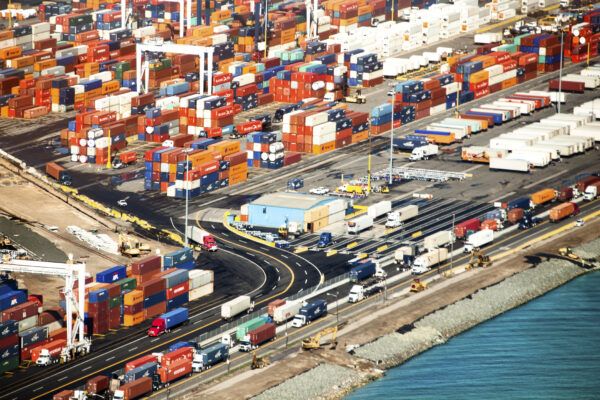Recent scientific debates highlight a paradox in pollution reduction. Reducing certain air pollutants, particularly sulphur emissions from shipping, is hugely beneficial for people’s health. But a decrease in sulphur emissions can temporarily increase the rate of global warming, as these particles reflect sunlight and therefore have temporary cooling effects.
Research led by climate scientist James Hansen in 2025 suggests that the International Maritime Organization’s (IMO) 2020 shipping regulations that cut sulphur emissions may have contributed to the spikes in global temperature observed in 2023 and 2024. Several other scientific publications have addressed the issue in recent years, including one from Carbon Brief. These publications estimate different degrees of radiative forcing (0.08-0.5 wm-2) impact attributed to low sulphur fuels.
However, these studies’ conclusions involve considerable uncertainties that are still actively debated within the scientific community. While the reduction of sulphur in the atmosphere is considered to have played a role in recent atmospheric warming, there are other factors that contributed to these warming spikes that need to be considered.
The short-term warming debate on shipping emissions
2023 was officially confirmed as the warmest calendar year on record, based on global temperature data dating back to 1850. 2023 was 0.60°C warmer than the 1991-2020 average and 1.48°C warmer than the 1850-1900 pre-industrial level. Sea surface temperatures also hit all-time highs, with several months of unprecedented warmth. High sea surface temperatures can fuel extensive marine heatwaves and intensify storm activity throughout the hurricane season.
Hansen’s study identifies reduced aerosol emissions from shipping, mandated by IMO2020 to address the severe impacts of sulphur on public health, as a significant contributor to the exceptional heat observed globally in 2023. This is because sulphur aerosols reflect sunlight, causing a temporary cooling effect on the atmosphere.
Additional studies attributed a global temperature increase of approximately 0.05°C — equivalent to two to three years of global warming — to the IMO 2020 regulations. Scientists’ evidence for this warming is increased sea-surface temperatures, damage to coral reefs and intensified extreme weather, such as extreme flooding. But recent warming cannot be attributed to one source of emissions alone and other papers raise significant scientific uncertainties which haven’t been addressed.
Several independent factors notably complicate how to attribute sources to recent warming. For instance, a recent study indicates that the warming spike in 2023 was significantly influenced by a global climate pattern known as the El Niño–Southern Oscillation. The study showed that a prolonged La Niña period can cause a short acceleration in warming. Additionally, unusually low dust levels in Africa during 2023 resulted in a reported 2-2.5°C increase in sea surface temperature, heightening the likelihood of early-season storms in the region. So definitively identifying the impact of sulphate emissions reduction from IMO 2020 on warming in 2023 is challenging. We need more evidence from multi-model assessments to come to a definitive conclusion.
Integrated climate and air quality policies are the path forward
The uncertainties around climate impacts of shipping emissions reductions should not impede efforts to reduce air pollution globally. The temporary warming caused by reduced sulphur aerosols must be balanced against air pollution’s well-documented health impacts. Cleaner marine fuels, as mandated by IMO 2020, significantly decrease cardiovascular and respiratory diseases, lung cancer and childhood asthma worldwide. Air pollution is the greatest environmental threat to human health globally, causing over 8 million premature deaths each year.
Policymakers should learn from measures like IMO 2020 and pursue strategies that integrate air quality improvements with targeted climate policies. More attention should be paid to addressing short-lived climate pollutants or super pollutants, such as black carbon, methane and tropospheric ozone. According to the IPCC, super pollutants are responsible for half of current global temperature increases. They have a relatively short life span in the atmosphere, so reducing these pollutants would have an immediate positive impact on the climate, as well as public health.
Decarbonisation efforts focused primarily on long-term warming may also reduce sulphur emissions, which can enhance warming in the short term. But combining decarbonisation efforts with super pollutant mitigation could achieve four times more avoided warming by 2050 and slow the rate of global warming a decade or two sooner than decarbonisation alone. Polices that focus on structural changes are the way forward, including transitioning from fossil fuels and enhancing energy efficiency, to improve air quality and climate stabilisation.
The additional co-benefits of improving air quality further justify continued action. Air pollution reduces solar energy potential as pollutants block or scatter sunlight, decreasing the amount of solar radiation reaching the earth’s surface. Solar energy production is a key component of global decarbonisation strategies. Globally, aerosols have been estimated to diminish solar power generation by over 50% in heavily polluted regions, including northern China.
Improved air quality significantly reduces healthcare costs associated with morbidity, mortality and agricultural productivity losses. These co-benefits substantially offset the costs of climate policies, supporting more ambitious climate action and advancing progress towards the Sustainable Development Goals. Clean air protects lives, boosts productivity, and supports ecosystems. While reducing air pollution may unmask warming, we have far better tools to handle heat than we do to cope with toxic air. Heat-related deaths are strongly influenced by access to cooling, healthcare, and infrastructure. Arguing against clean air to “keep things cool” not only ignores this, it deepens the injustice of historical emissions by asking the poorest to keep breathing harmful air for the sake of climate trade-offs.
This piece was written with contributions from Victor Indasi and Elvis Kyere-Gyeabour.


